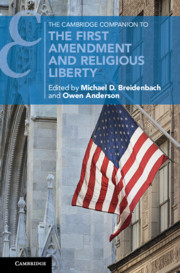Book contents
- The Cambridge Companion to the First Amendment and Religious Liberty
- Cambridge Companions to Law
- The Cambridge Companion to the First Amendment and Religious Liberty
- Copyright page
- Dedication
- Contents
- Notes on Contributors
- Acknowledgments
- Introduction
- Part I Philosophical Foundations
- Part II Historical Interpretations
- 4 Religious Exercise and Establishment in Early America
- 5 The Historical Context of the Religion Clauses of the First Amendment
- 6 Religious Tests, Loyalty Oaths, and the Ecclesiastical Context of the First Amendment
- 7 Church and State in the Nineteenth Century
- 8 The First Amendment Religion Clauses in the United States Supreme Court
- Part III Law, Politics, and Economics
- Index
6 - Religious Tests, Loyalty Oaths, and the Ecclesiastical Context of the First Amendment
from Part II - Historical Interpretations
Published online by Cambridge University Press: 17 December 2019
- The Cambridge Companion to the First Amendment and Religious Liberty
- Cambridge Companions to Law
- The Cambridge Companion to the First Amendment and Religious Liberty
- Copyright page
- Dedication
- Contents
- Notes on Contributors
- Acknowledgments
- Introduction
- Part I Philosophical Foundations
- Part II Historical Interpretations
- 4 Religious Exercise and Establishment in Early America
- 5 The Historical Context of the Religion Clauses of the First Amendment
- 6 Religious Tests, Loyalty Oaths, and the Ecclesiastical Context of the First Amendment
- 7 Church and State in the Nineteenth Century
- 8 The First Amendment Religion Clauses in the United States Supreme Court
- Part III Law, Politics, and Economics
- Index
Summary
This chapter investigates the two non-establishment clauses in the U.S. Constitution: the no-religious-test clause in Article VI, and the no-establishment-of-religion clause in the First Amendment. Since religious tests were the clearest manifestation of state sovereignty over religion, their prohibition in Article VI elided any notion of a “Church of the United States” even before the First Amendment. The federal oath-Congress’s first act-no longer required a denial of Catholic beliefs as previous oaths had, yet loyalty remained a prerequisite to securing religious liberty. The chapter then contends that the First Amendment establishment clause was based on what Congress had stated in 1783: that powers in “purely spiritual” matters were “reserved to the several States, individually.” Congress had declared this principle in response to the Holy See’s request for it to approve a Catholic bishop, and had thus renounced one of the rights of patronage that governments traditionally held over ecclesiastical affairs. This context adds to the original meaning of the establishment clause, for simply prohibiting a national church did not necessarily forbid this right of patronage.
Keywords
- Type
- Chapter
- Information
- Publisher: Cambridge University PressPrint publication year: 2020



